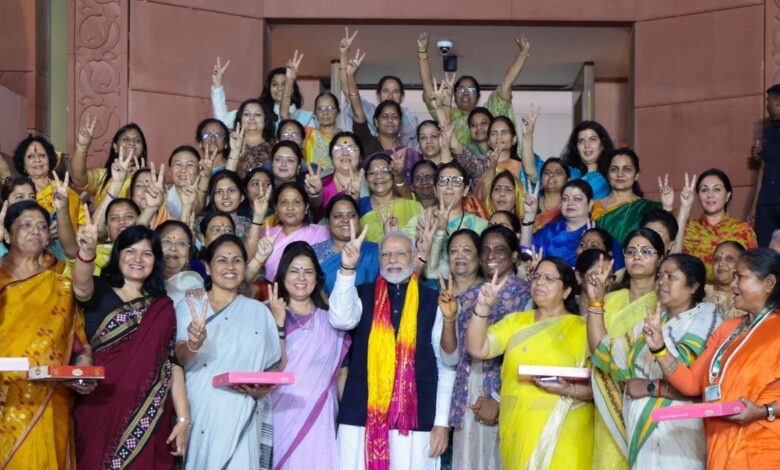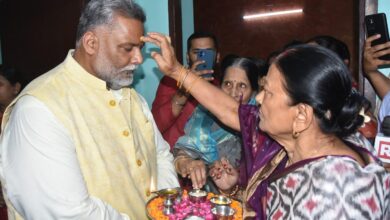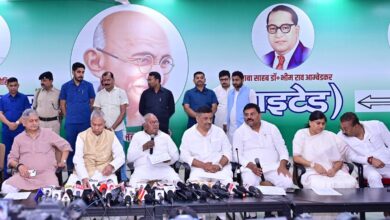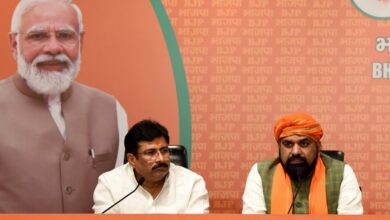Women’s reservation bill for gender equality in parliament, assemblies
Bihar CM Nitish Kumar demands immediate implementation of women’s reservation bill

On September 21, Rajya Sabha, the upper house of parliament, unanimously passed the Constitution (128th Amendment) Bill — Nari Shakti Vandan Adhiniyam – that seeks to reserve one-third of seats in the Lok Sabha and state assemblies for women. A day before, it received near-unanimous approval in the Lok Sabha, the lower house of parliament. So it is set to become a law and will be implemented after census and delimitation.
The bill, which was pending for over 25 years, was passed during a special session of Parliament. This is the first bill passed in the new Parliament building.
The women’s reservation bill was first introduced in 1996 in the Lok Sabha by the H.D. Deve Gowda-led United Front government, the Bill did not get the approval of the House. Since then, all the governments have made efforts to get passed in the parliament. In 2010, the UPA government even managed to secure its passage in the Rajya Sabha. But, due to a shortage of political determination and agreement, the initiative ultimately did not succeed.
History of Women’s Reservation in elected bodies
The idea for providing reservation for women in elected bodies was first introduced in 1989 by the then Prime Minister Rajiv Gandhi-led government. In May 1989, Gandhi-led government introduced the Constitution Amendment Bill to provide one-third reservation for women in rural and urban local bodies. The Bill was passed in Lok Sabha but failed to get passed in Rajya Sabha in September 1989.
In 1992 and 1993, then prime minister P.V. Narasimha Rao reintroduced the Constitution Amendment Bills 72 and 73, which reserved one third (33%) of all seats and chairperson posts for women in rural and urban local bodies. The Bills were passed by both the houses and became the law of the nation. Now there are nearly 15 lakh elected women representatives in Panchayats and Nagarpalikas across the country.
September 12, 1996, then Deve Gowda-led United Front government for the first time introduced the 81st Constitution Amendment Bill in Lok Sabha for reservation of women in the Parliament. After the Bill failed to get approval in Lok Sabha, it was referred to a Joint Parliamentary Committee chaired by Geeta Mukherjee. The Mukherjee committee presented its report in December 1996. However, the Bill lapsed with the dissolution of the Lok Sabha.
Two years later, the Atal Bihari Vajpayee-led NDA government pushed the WRB Bill in the 12th Lok Sabha in 1998. However, this time too, the Bill failed to get support, and lapsed again. It was subsequently reintroduced in 1999, 2002 and 2003 under the Vajpayee government, but with no success.
Five years later, the WRB bill again gained some traction during Manmohan Singh-led UPA government-1. In 2004, the government included it in its Common Minimum Programme and finally tabled it on 6 May 2008, this time in Rajya Sabha to prevent it from lapsing again. Five of the seven recommendations made by the 1996 Geeta Mukherjee Committee were included in this version of the Bill. The legislation was sent to the standing committee on May 9, 2008. The standing committee presented its report on December 17, 2009. It got the stamp of approval from the Union Cabinet in February 2010. The Bill was eventually passed in the Rajya Sabha with 186-1 votes on March 9, 2010.
However, the Bill was never taken up for consideration in the Lok Sabha and eventually lapsed in 2014 with the dissolution of the Lok Sabha. Bills introduced/ passed in Rajya Sabha do not lapse.
Salient features of women’s reservation bill:
- The bill, called the ‘Nari Shakti Vandan Adhiniyam’, seeks to reserve 33% seats for women in Lok Sabha, state legislative assemblies and the Delhi assembly.
- The reservation will not apply to Rajya Sabha or state Legislative Councils.
- Reservation of seats shall come into effect after delimitation is undertaken after the relevant figures for the first census have been published.
- The women’s reservation bill was passed in Lok Sabha on September 20 with 454 members supporting it and two opposing it. The bill was passed unanimously in Rajya Sabha on September 21.
- The bill now requires the approval of a majority of the state assemblies. It will be implemented after a delimitation exercise based on the Census data.
- The reservation will be provided for a period of 15 years. However, it shall continue until such date as determined by a law made by Parliament.
- Seats reserved for women will be rotated after each delimitation, as determined by a law made by Parliament.
- Women presently make up for nearly half of India’s 95 crore registered voters but comprise only 15 per cent of lawmakers in Parliament and 10 per cent in the state assemblies.
What is Delimitation Exercise?
Under the existing laws, the Delimitation Commission is headed by a retired Supreme Court Judge, and does the work of analysis of the Census data. The Commission is expected to demarcate fresh Lok Sabha constituencies on the basis of the Census data. Constituencies are reserved for Scheduled Castes and Scheduled Tribes according to the Census figures.
Once Parliament enacts a Delimitation Act, the Centre constitutes a Delimitation Commission headed by a retired Supreme Court judge. The orders of this high-powered body are legally binding and not subject to scrutiny by any court of law. Even Parliament cannot suggest modifications to an order issued by the commission, which also constitutes the Chief Election Commissioner or any of the two Election Commissioners. In case the exercise is specifically for a state, the election commissioner of that state is also a member of the commission.
Bihar CM demands immediate implementation
Extending support to the women’s reservation bill, Bihar Chief Minister Nitish Kumar demanded that the bill should be implemented without any delay.
“From the beginning, we have demanded that the bill should be implemented without any delay. The women from the Backward class and Extreme Backward class and the SC/ST should get reservations. It is good that 33 per cent of seats will be reserved for women and we wish that it should increase further” Kumar said.
Bihar CM said that the bill should have been implemented at a faster pace but it would get further delayed due to the provision of census.
“We have been demanding the Women’s Reservation Bill since very young age. The census was happening every 10 years and this started in 1931 and this is the first time it has been delayed. Whenever the bill is implemented it would be welcomed,” he added.




